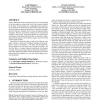Free Online Productivity Tools
i2Speak
i2Symbol
i2OCR
iTex2Img
iWeb2Print
iWeb2Shot
i2Type
iPdf2Split
iPdf2Merge
i2Bopomofo
i2Arabic
i2Style
i2Image
i2PDF
iLatex2Rtf
Sci2ools
ATAL
2008
Springer
2008
Springer
Strategic betting for competitive agents
In many multiagent settings, each agent's goal is to come out ahead of the other agents on some metric, such as the currency obtained by the agent. In such settings, it is not appropriate for an agent to try to maximize its expected score on the metric; rather, the agent should maximize its expected probability of winning. In principle, given this objective, the game can be solved using game-theoretic techniques. However, most games of interest are far too large and complex to solve exactly. To get some intuition as to what an optimal strategy in such games should look like, we introduce a simplified game that captures some of their key aspects, and solve it (and several variants) exactly. Specifically, the basic game that we study is the following: each agent i chooses a lottery over nonnegative numbers whose expectation is equal to its budget bi. The agent with the highest realized outcome wins (and agents only care about winning). We show that there is a unique symmetric equil...
| Added | 12 Oct 2010 |
| Updated | 12 Oct 2010 |
| Type | Conference |
| Year | 2008 |
| Where | ATAL |
| Authors | Liad Wagman, Vincent Conitzer |
Comments (0)

